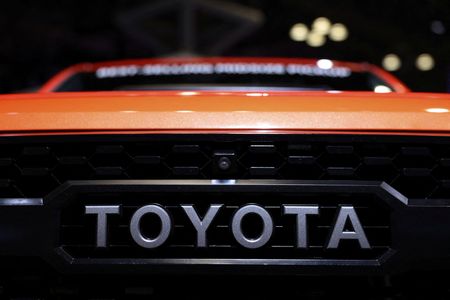 1
1 1
1
By Daniel Leussink
TOKYO (Reuters) -Toyota Motor Corp on Wednesday said it expects operating profit to climb 10% this business year, with a five-fold jump in pure electric vehicle (EV) sales amid an easing in global supply chain disruption from a shortage of chips.
The growth plan was unveiled by new CEO Koji Sato, installed last month, and signals a more aggressive push towards electrification by the Japanese firm that has previously pursued a go-slow approach to all-electric cars, arguing its strategy would provide more consumer choice.
The world’s biggest car maker by sales forecast battery EV sales, including those of its luxury Lexus brand, would reach 202,000 worldwide this business year through March 2024 – up more than fivefold from 38,000 units last year.
Toyota forecast operating profit would rise to 3.0 trillion yen ($22.2 billion) this business year, in line with an analysts’ average forecast of 3.02 trillion yen.
That target came after operating profit for the fiscal fourth quarter through March surged more than a third to 626.9 billion yen – easily ahead of the average 553.46 billion yen profit estimated by 10 analysts, according to Refinitiv data.
Toyota’s strategy has seen it come under pressure in China, the world’s biggest auto market, where nimble local brands such as BYD Co Ltd have moved aggressively with battery EVs, weakening dominance of established foreign brands.
But Sato said the demand for purely battery-powered vehicles in China largely represented a new need in the market and was separate from demand for hybrid vehicles.
“We would like to work on both sides,” he said.
The profit target has been helped by a weak yen boosting the value of overseas sales, and higher output volumes that outweighed the impact of surging materials costs. Reflecting the impact of the weak yen, revenue for the business year that ended in March this year grew to a record 37.15 trillion yen.
Toyota shares, which were nearly flat before the release of the earnings, surged immediately on their publication and rose as much as 2.5% before paring gains to close up 0.8%.
EV ACCELERATION
The new EV sales target, still a fraction of industry leader Tesla, would boost Toyota’s battery EVs to nearly 2% of total sales volume, up from just 0.4% of its total vehicle sales in the last fiscal year.
“We expect an increase in (overall) sales volume in all regions and production volume of 10.1 million (vehicles), due to such factors as … improvement in semiconductor supply,” Toyota said in a statement. That would represent output growth of 11% versus the previous year.
Seeking to raise its game in the EV sector, where it has been outstripped by new Chinese automakers as well as Tesla, Toyota has said it will introduce 10 new battery-powered vehicles, targeting sales of 1.5 million EVs a year by 2026.
Toyota will speed up its push to provide “appropriate” solutions for different regions, said Sato, adding that new models would range from compact commercial to luxury vehicles and be centred mainly on the United States and China.
A previously announced dedicated unit to focus on next-generation battery EVs, known as BEV Factory, would consist of three platforms focusing on vehicle chassis, electronics and software, he said.
The company decided to abolish a zero emissions vehicle design division, known as ZEV factory, it had set up in Japan.
Though Toyota has succeeded in keeping its crown as the world’s top-selling automaker, it faces a raft of challenges including safety test problems at its affiliate Daihatsu and mounting pressure from green investors.
($1 = 135.0500 yen)
(Reporting by Daniel Leussink; Editing by Miyoung Kim and Kenneth Maxwell)